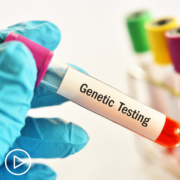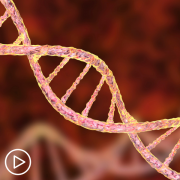Essential Testing Following a Prostate Cancer Diagnosis
Essential Testing Following a Prostate Cancer Diagnosis from Patient Empowerment Network on Vimeo.
What essential tests do prostate cancer patients need following a diagnosis? Dr. David Wise shares an overview of imaging, scans, and targeted testing to help guide an optimal care and treatment plan for each patient.
Dr. David Wise is Director of Genitourinary Medical Oncology at the Laura and Isaac Perlmutter Cancer Center at NYU Langone Health. Learn more about Dr. Wise.
See More From INSIST! Prostate Cancer
Related Resources

Prostate Cancer Testing: What Tests Should You Advocate For? |

What Do Prostate Cancer Patients Need to Know About Genetic Testing? |

Why Should You Ask Your Doctor About Prostate Cancer Genetic Testing? |
Transcript:
Dr. David Wise:
Sure. So, that’s a great question. The testing for prostate cancer really has advanced over the last decade. So, it’s very much standard, of course, for patients to have a biopsy to confirm evidence of prostate cancer. That biopsy will assess for the Gleason score, which gives us information about how abnormal those cells look under the microscope.
It remains the most important feature for understanding the risk of the cancer and how intensive the treatment needs to be to treat that cancer. Of course, the PSA at the time of diagnosis is also useful for that assessment of risk. And the MRI is the third key feature that we look at, the MRI of the prostate, that is, which is often done before biopsy and often guides the biopsy for the urologists to make sure that they’re sampling the most concerning nodule within the prostate. And that MRI gives us information about the extent of the cancer, whether there had been any spread of the cancer, and the overall size of the prostate cancer mass. Now, over the past few years, there’s been some changes.
So, patients with high risk or very high risk but nonmetastatic prostate cancer are often also imaged with something called PET scan, which is specific for prostate cancer looking at the levels of a protein called PSMA. And there are several brand names that will provide that imaging test through this PET imaging scan. That also gives us an even more accurate sense of the extent of the cancer, whether it has spread or not.
And I think what’s really important is also thinking about the genetics of the cancer. And so, for patients with high-risk early-stage prostate cancer or metastatic prostate cancer and for patients with a significant family history or with an Ashkenazi Jewish ancestry, we recommend hereditary genetic testing.
And that needs to be distinguished from testing of the tumor itself or testing of the DNA derived from the tumor, which is called somatic testing. And it is not a hereditary test, but it’s a test that actually gives us information about the genes that are mutated and promoted at the development of that cancer. And that somatic testing is important, but it’s really critical for men who have advanced prostate cancer, metastatic hormone-resistant prostate cancer, where we already have FDA-approved treatments that are tailored to the results of those gene test results.
So, those are really the standard tests that we think about. There are some emerging tests I think that some oncologists will recommend, and some won’t. The most prominent of those is the Decipher genomic score. So, that’s a test that also uses RNA or a type of genetic information from the cancer that can be used to assess the risk.
And in my experience, that gives sometimes complementary information and adds further, I would say, or sheds further light on the tests that we already have. And particularly for men with otherwise intermediate risk prostate cancer, sometimes, the Decipher test can give us some more clarity, but I don’t think it’s absolutely critical at this time to order that test. I think we usually get the information that we need from the test that we have.






